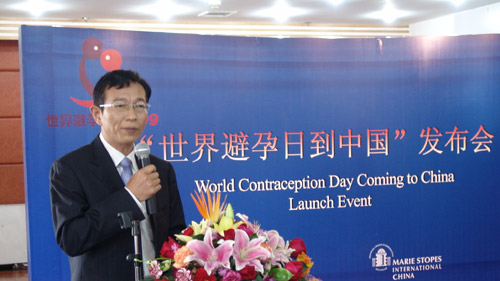By Wang Zhiyong
China.org.cn staff reporter
|

|
|
Logo of the World Contraception Day. |
What's the difference between having a child at 16 and having one at 30? Perhaps this question has never been asked so frequently as on this Saturday, September 26.
September 26 was the third World Contraception Day, an annual worldwide campaign that aims to raise awareness of contraception, reduce the high levels of unplanned pregnancies, and improve the level of education regarding reproductive and sexual health.
In Beijing, experts and volunteers from several NGOs including Marie Stopes International China (MSIC) as well as officials from the Chinese government agency, China Population Communication Center (CPCC), gathered to mark the event.
The theme of this year's campaign is Your Life, Your Voice: Talk Contraception. Its objective is to encourage teenagers in particular to talk to people they trust, so they have all the information they need to prevent an unplanned pregnancy or sexually transmitted infection.
Worryingly, surveys show that some 210 million women get pregnant every year across the globe, of which, 79.8 million pregnancies are unplanned, and 46.2 million result in abortions. Approximately 38 percent of pregnancies worldwide are unwanted and 22 percent of all pregnancies end in an abortion, said Ms. Sun Tiezheng, director of the MSIC.
|

|
|
Zhang Hanxiang, director of China Population Communication Center?gave a speech at the launch event of the?World Contraception Day in Beijing on September 26, 2009. [Photo by Wang Zhiyong/China.org.cn] |
In China, recent statistics show that 13 million women procure abortions every year, a sign that unsafe sex poses a threat to the country's women and girls. The data is based on figures from public health bodies, meaning that the numbers could be even higher if illegal abortions carried out in unlicensed clinics are taken into account. Besides that, around 10 million "morning after" pills are sold each year, said Ms. Sun.
Research also shows that 80 percent of Chinese people have never talked about contraception and 25 percent use no contraception when having sex for the first time, added Ms. Liu Liqing, program director of MSIC.
"In 1970s, Chinese girls had their first period at an average age of 14.5 and got married at age of 20.6. Now, Chinese girls are having their first period at 12 years old and getting married at 22.5. With attitudes toward sex changing, relevant education is lacking," noted Ms. Liu Liqing.
The sex education program in schools is not succeeding in changing sexual behavior among young people. The contents of Chinese textbooks on the subject are so meager that the right messages are not getting through to youth, said Zhang Hanxiang, director of China Population Communication Center.
Better sex education is urgently needed but opposition from civil society groups has led to a practice of avoiding any sex education programs on Chinese television, said Prof Bu Wei. She suggested that advocacy work was needed to change this situation.
This year's World Contraception Day is the third globally but is being marked in China for the first time.
Ms. Sun Tiezheng told China.org.cn that MISC volunteers have organized many activities throughout China. MISC has established more than 40 student groups in universities and over 4,000 peer education activities have been carried out. During World Contraception Day, activities are being held in cities like Suzhou, Nanning, Xi'an, Zhengzhou, Dongguan and Qingdao.
Launched in 2007, World Contraception Day campaign is supported by a coalition of several international NGOs including Marie Stopes International, the Population Council, the Asia Pacific Council on Contraception, the European Society of Contraception and Reproductive Health, Bayer HealthCare, the International Planned Parenthood Federation, the German Foundation for World Population, Celsam, the Pan American Health and Education Foundation and USAID.
(China.org.cn September 27, 2009)